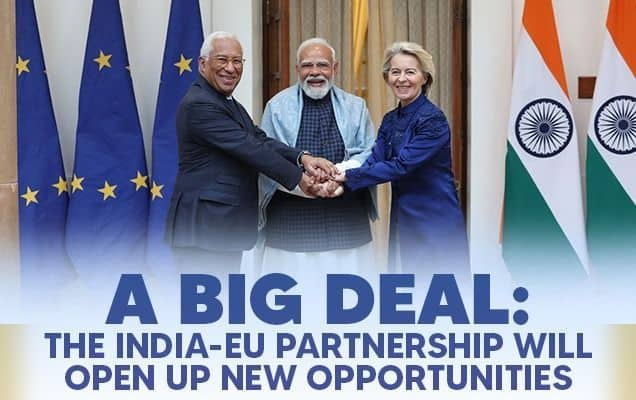The Prime Minister gave a timely glimpse into how policy making in the country needs to evolve with the times. Speaking on the occasion of release of "Getting India Back on track – an Action agenda for reform", in a function at 7, Race Course Road, New Delhi he said policy making should incorporate inputs from universities and intellectual think tanks. The Prime Minister, Shri Narendra Modi, today said "the input of intellectual think tanks" should be substantially enhanced for better policy frameworks. Focussing on the need for better long term planning he said, “Universities should also be actively involved in research and analysis of the developmental process, to contribute in the best possible way for policy-related decisions.”
Sharing a futuristic vision, he said infrastructure focus needs to shift from highways to "information highways which he says are I-ways. Stressing on the need for building better optical fibre networks he said while cities in the past were built on river-banks, they will now be built based on availability of optical-fibre networks and next-generation infrastructure.
The Prime Minister said that he wants the country to treat urbanisation as an opportunity and not a problem. He said if we have to generate employment and change for the better, we plan to build 100 smart cities. Using anecdotes and analogies, the Prime Minister cited the three colours of the National Flag, to suggest revolutionary agendas of futuristic growth.

Beginning with green, he said we need to bring about a second green revolution – focusing on increased agro-productivity, value addition, agro technology, and decentralization of warehousing. Referring to white, he said a white revolution must now focus on increasing milk productivity, and developing a support system for ensuring cattle health. The Prime Minister said, saffron colour represents energy – and we need a saffron revolution that focuses on renewable energy sources such as solar energy, to meet India's growing energy demand. Inspired by the blue colour of the Ashok Chakra in the National Flag, he said the blue revolution should focus on the fisheries sector, including ornamental fish.
Shri Modi stressed on the need for water conservation, and emphasized the importance of micro-irrigation, which would lead to "per drop, more crop." He said that micro-irrigation had been successful in improving productivity and quality in crops like sugarcane in Gujarat.
He said we need to exploit the demographic dividend, as 65 percent of our population was below 35 years of age. For this skill development needs to be a priority area. Referring to skills such as teaching, nursing and paramedics, he said good teachers were one of the biggest needs of society, but there are very few good teachers available. He asked the audience why India should not aim to become an exporter of good teachers who would capture the imagination of an entire generation globally. He said if India has to compete with China, the focus should be on skill, scale and speed.
Talking about the need to combat the challenge of global warming and climate change, the Prime Minister said that a civilization that treated rivers as mothers, did not need to learn about environment protection from a western mindset. Overall, the speech gave insights into how India’s economic policy making is set to undergo a much needed change with a promise of bigger and better opportunities for the citizens of the country.
Speaking on the occasion, Minister for Finance, Corporate Affairs and Defence, Shri Arun Jaitley said there could not have been a more appropriate time for release of the book. He said Governments should not only have the will to rule, but also the credibility to rule. He said the international community was once again looking at India, and it is an opportunity that we cannot afford to miss.














